|
Joseph Cornell
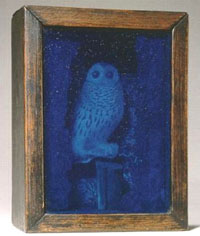
Joseph Cornell was a great, failed sculptor. By this, I mean that he never achieved the level of public recognition that he deserved; indeed, he was marginalized by the art establishment and little known to the public. Some of this may be due to the fact that he remained essentially a surrealist throughout the forty years of his creative output. It didn't help that his personality was shy and reclusive. He never ventured more than a hundred miles from his home. Despite all of this, he created some of the most beautiful, original and intriguing works of art in the twentieth century.
He spent most of his life sequestered in a modest house in Long Island, New York with his mother and his invalid brother. It was for the amusement of his brother that Cornell began making little assemblages in boxes, in the early 1930s. Inspired by the collages of Max Ernst and other early surrealist works, he began a voyage of discovery that would consume him for the next four decades. He was an avid collector of the ready-mades of the time: souvenirs, toys, and cast-offs such as corks and empty tins. These objects he would assemble within box frames, to create three-dimensional tableaux. His artistic sensitivity and vision were such that what took form were not mere "memory boxes" but a kind of museum of his unconscious mind. His boxes have also been described as "toys for grown-ups", which is equally apt.
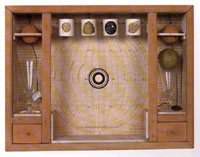
Cornell loved many women, but as far as is known, only from afar. It did not help that the objects of his infatuation were actresses such as Lauren Bacall and Hedy Lamarr, or ballerinas like Tamara Toumanova and Allegra Kent. He possessed them in his mind, and constructed assemblages in their honor. He also became friends with Susan Sontag and André Breton, and artists such as Mark Rothko, Robert Motherwell and Walter de Maria.
Since his death in 1972, much has been written about Cornell's symbology, and I certainly do not intend to try to do any justice to its depth in these few paragraphs. Suffice it to say that his work reveals ever more meaning and delight with each viewing, and that he deserved to be regarded in his lifetime as a creator equal in stature to any of the greatest artists of his time. On the day he died, he said to his sister "I wish I had not been so reserved."
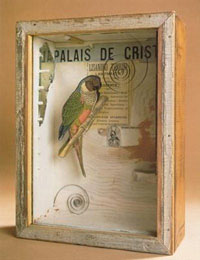
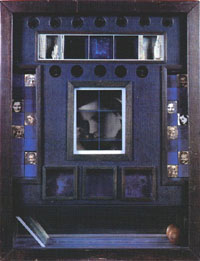
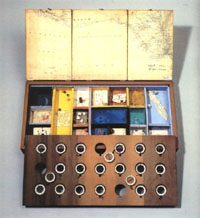
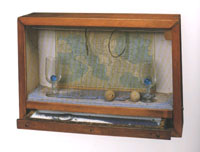
|

